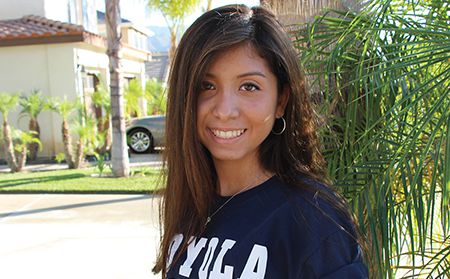The PSA begins with a girl in a white blouse turning a corner and slowly walking between lockers down a high school hallway. She has a shy expression that becomes more concerned as she goes by doors with posted black jagged letters saying “Bullied,” “Anorexic,” “Anxiety” and “Depression.”
Other students hurry off as a class bell rings.
On the screen come the words, “Don’t assume others will help.”
A close-up shows her hand turning a golden doorknob. A teenage boy walks out with a grateful look. Her pace quickens as she opens the door marked “Depression,” then “Anorexic” and others.
Finally, she comes back to the “Bullied” door. When it’s opened, a smiling young woman emerges. They lock arms and walk off.
“Be the first to open the door,” appears on the screen. Then, “Be the first to step to the fore,” a quote from David Lenga, a man with a wrinkled face and thinning white hair, who is identified as a Holocaust survivor.
Later on, there are shots of him sitting at a round table talking with other students.
The public service announcement is a little over 60 seconds. But it seems even shorter, more like a New York minute. The credits say “Open the Door” was created by five students — Emma Bloom, Trey Carlisle, Dora Palmer, Harrison Shea and Sofia Servin — from The Righteous Conversations Project, a program of the Los Angeles Museum of the Holocaust, a collaboration of survivors and teens.
And last month, the creative team’s work won “Best PSA” at the national All American High School Film Festival in New York City.
Showing somebody cares
“We had the opportunity to create these PSAs on issues we feel passionate about,” Servin told The Tidings. “And the issues that our PSA were concerned with were depression, loneliness and teen anxiety. Basically, it’s supposed to tell people to have empathy.
“Because so often we see the signs in other people, but we don’t want to include ourselves in their issues. And we think it’s the polite thing to do. But, in fact, it might have been the best thing to do for that person to know that they’re not alone and that somebody out there cares.”
The 16-year-old Louisville High School junior from Stevenson Ranch plays the shy coed who winds up opening the doors in the public service announcement. She and the other four young filmmakers shot it at Harvard-Westlake School, while attending a weeklong summer camp there in 2013.
After brainstorming what would have the biggest impact on other teens, they filmed the PSA in one marathon day without breaks and edited it during another.
She thought the video was just a neat “little” endeavor meant mainly for the self-enrichment of herself and teammates. So it was a big surprise when it started making the rounds of high school film festivals and was even shown in a few local movie theaters — never mind taking home the top Public Service Award at the national high school film festival.
What she really found enriching at the summer camp was hearing the terribly moving stories of actual holocaust survivors. These personal accounts “ignited some sort of fire within us” and made the students want to do something about today’s social justice issues.
“Me being a teenager, I know how hard it is to actually be motivated and do something once you’re shown something,” pointed out Servin, who wants to become a physician. “Like, you can be shown a video of people dying, and you just think to yourself: ‘Oh, poor thing.’ But that’s the end of it.
“And I know that not everyone is going to be motivated to live out the message that we’re trying to spread with the PSA. But my intention was, and is, that ‘Hey, at least a couple of people, or one person, will try.’
“And that’s what I believe will happen,” she stressed in a quiet voice. “That alone satisfies me.”

